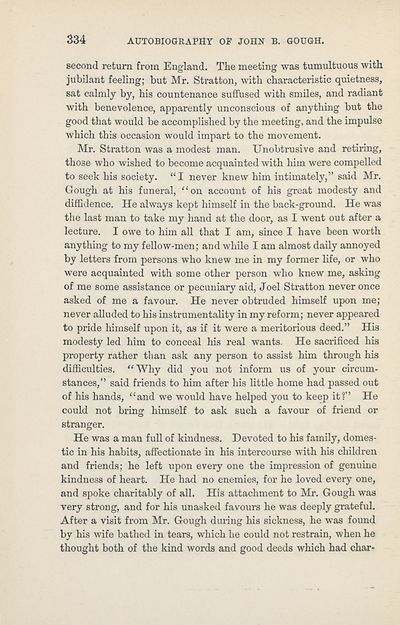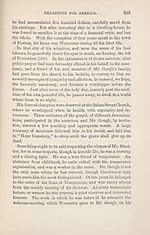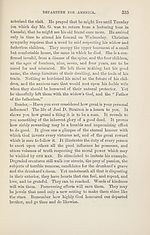Download files
Complete book:
Individual page:
Thumbnail gallery: Grid view | List view

334
AUTOBIOGRAPHY OP JOHN B. GOUGH.
second return from England. The meeting was tumultuous with
jubilant feeling; but Mr. Stratton, with characteristic quietness,
sat calmly by, his countenance suffused with smiles, and radiant
with benevolence, apparently unconscious of anything but the
good that would be accomplished by the meeting, and the impulse
which this occasion would impart to the movement.
Mr. Stratton was a modest man. Unobtrusive and retiring,
those who wished to become acquainted with him were compelled
to seek his society. “ I never knew him intimately,” said Mr.
Gough at his funeral, “on account of his great modesty and
diffidence. He always kept himself in the back-ground. He was
the last man to take my hand at the door, as I went out after a
lecture. I owe to him all that I am, since I have been worth
anything to my fellow-men; and while I am almost daily annoyed
by letters from persons who knew me in my former life, or who
were acquainted with some other person who knew me, asking
of me some assistance or pecuniary aid, Joel Stratton never once
asked of me a favour. He never obtruded himself upon me;
never alluded to his instrumentality in my reform; never appeared
to pride himself upon it, as if it were a meritorious deed.” His
modesty led him to conceal his real wants. He sacrificed his
property rather than ask any person to assist him through his
difficulties. “Why did you not inform us of your circum¬
stances,” said friends to him after his little home had passed out
of his hands, “and we would have helped you to keep it?” He
could not bring himself to ask such a favour of friend or
stranger.
He was a man full of kindness. Devoted to his family, domes¬
tic in his habits, affectionate in his intercourse with his children
and friends; he left upon every one the impression of genuine
kindness of heart. He had no enemies, for he loved every one,
and spoke charitably of all. His attachment to Mr. Gough was
very strong, and for his unasked favours he was deeply grateful.
After a visit from Mr. Gough during his sickness, he was found
by his wife bathed in tears, which he could not restrain, when he
thought both of the kind words and good deeds which had char-
AUTOBIOGRAPHY OP JOHN B. GOUGH.
second return from England. The meeting was tumultuous with
jubilant feeling; but Mr. Stratton, with characteristic quietness,
sat calmly by, his countenance suffused with smiles, and radiant
with benevolence, apparently unconscious of anything but the
good that would be accomplished by the meeting, and the impulse
which this occasion would impart to the movement.
Mr. Stratton was a modest man. Unobtrusive and retiring,
those who wished to become acquainted with him were compelled
to seek his society. “ I never knew him intimately,” said Mr.
Gough at his funeral, “on account of his great modesty and
diffidence. He always kept himself in the back-ground. He was
the last man to take my hand at the door, as I went out after a
lecture. I owe to him all that I am, since I have been worth
anything to my fellow-men; and while I am almost daily annoyed
by letters from persons who knew me in my former life, or who
were acquainted with some other person who knew me, asking
of me some assistance or pecuniary aid, Joel Stratton never once
asked of me a favour. He never obtruded himself upon me;
never alluded to his instrumentality in my reform; never appeared
to pride himself upon it, as if it were a meritorious deed.” His
modesty led him to conceal his real wants. He sacrificed his
property rather than ask any person to assist him through his
difficulties. “Why did you not inform us of your circum¬
stances,” said friends to him after his little home had passed out
of his hands, “and we would have helped you to keep it?” He
could not bring himself to ask such a favour of friend or
stranger.
He was a man full of kindness. Devoted to his family, domes¬
tic in his habits, affectionate in his intercourse with his children
and friends; he left upon every one the impression of genuine
kindness of heart. He had no enemies, for he loved every one,
and spoke charitably of all. His attachment to Mr. Gough was
very strong, and for his unasked favours he was deeply grateful.
After a visit from Mr. Gough during his sickness, he was found
by his wife bathed in tears, which he could not restrain, when he
thought both of the kind words and good deeds which had char-
Set display mode to:
![]() Universal Viewer |
Universal Viewer | ![]() Mirador |
Large image | Transcription
Mirador |
Large image | Transcription
| Antiquarian books of Scotland > Temperance > Autobiography and personal recollections of John B. Gough > (346) |
|---|
| Permanent URL | https://digital.nls.uk/125991521 |
|---|
| Description | Thousands of printed books from the Antiquarian Books of Scotland collection which dates from 1641 to the 1980s. The collection consists of 14,800 books which were published in Scotland or have a Scottish connection, e.g. through the author, printer or owner. Subjects covered include sport, education, diseases, adventure, occupations, Jacobites, politics and religion. Among the 29 languages represented are English, Gaelic, Italian, French, Russian and Swedish. |
|---|

